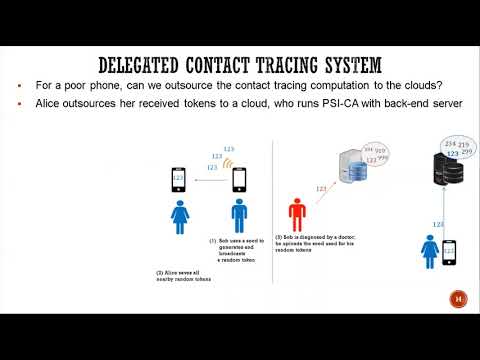CryptoDB
Catalic: Delegated PSI Cardinality with Applications to Contact Tracing
| Authors: | |
|---|---|
| Download: | |
| Presentation: | Slides |
| Abstract: | Private Set Intersection Cardinality (PSI-CA) allows two parties, each holding a set of items, to learn the size of the intersection of those sets without revealing any additional information. To the best of our knowledge, this work presents the first protocol that allows one of the parties to delegate PSI-CA computation to untrusted servers. At the heart of our delegated PSI-CA protocol is a new oblivious distributed key PRF (Odk-PRF) abstraction, which may be of independent interest. We explore in detail how to use our delegated PSI-CA protocol to perform privacy-preserving contact tracing. It has been estimated that a significant percentage of a given population would need to use a contact tracing app to stop a disease’s spread. Prior privacy-preserving contact tracing systems, however, impose heavy bandwidth or computational demands on client devices. These demands present an economic disincentive to participate for end users who may be billed per MB by their mobile data plan or for users who want to save battery life. We propose Catalic (ContAct TrAcing for LIghtweight Clients), a new contact tracing system that minimizes bandwidth cost and computation workload on client devices. By applying our new delegated PSI-CA protocol, Catalic shifts most of the client-side computation of contact tracing to untrusted servers, and potentially saves each user hundreds of megabytes of mobile data per day while preserving privacy. |
Video from ASIACRYPT 2020
BibTeX
@article{asiacrypt-2020-30709,
title={Catalic: Delegated PSI Cardinality with Applications to Contact Tracing},
booktitle={Advances in Cryptology - ASIACRYPT 2020},
publisher={Springer},
doi={10.1007/978-3-030-64840-4_29},
author={Thai Duong and Duong Hieu Phan and Ni Trieu},
year=2020
}

